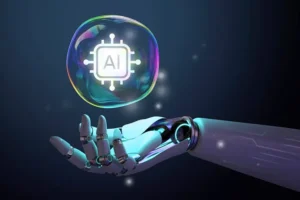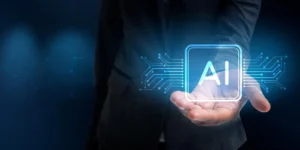
The rise of Artificial Intelligence (AI) has sparked one of the most profound debates in modern science and philosophy: How does AI compare to human intelligence? While AI has made incredible advancements, it remains fundamentally different from the intelligence possessed by humans. In this article, we’ll explore the key differences in capabilities, ethics, and future risks associated with AI and human intelligence, offering a thought-provoking comparison.
1. Capabilities: The Strengths and Weaknesses of AI vs Human Intelligence
AI: Power in Processing and Repetition
AI excels in areas that require speed, precision, and massive data processing. AI systems can analyze and process vast amounts of data far faster than any human could. Whether it’s calculating complex algorithms, predicting patterns in large datasets, or automating repetitive tasks, AI has proven to be an invaluable tool.
- Strengths:
- Data-Driven Tasks: AI can analyze patterns in massive datasets, uncovering insights that humans might miss. It’s used in fields like finance, healthcare (e.g., diagnosing diseases), and marketing to personalize recommendations.
- Speed and Precision: In tasks like calculations, AI can outperform humans by several orders of magnitude, reducing the chances of error and executing actions with incredible speed.
- Automation: AI can automate mundane or dangerous tasks, freeing up humans to focus on more complex, creative, and nuanced work.
Human Intelligence: Creativity, Emotion, and Complex Reasoning
In contrast, human intelligence is characterized by its flexibility, creativity, emotional depth, and complex reasoning. Humans can adapt to new situations, think critically, and understand abstract concepts in a way AI cannot replicate.
- Strengths:
- Emotional and Social Intelligence: Humans are uniquely capable of understanding emotions, reading social cues, and making ethical decisions that require empathy and moral judgment. These human traits play a key role in leadership, counseling, and social interactions.
- Creative Thinking: While AI can generate solutions based on patterns, human intelligence can think outside the box, combining seemingly unrelated concepts to create innovative ideas and artistic expression.
- Generalized Learning: Humans can apply their knowledge to a broad range of contexts and solve novel problems with little prior experience — a trait known as general intelligence, something AI still struggles with.
2. Ethics and Morality: The Human Edge
One of the most profound distinctions between AI and human intelligence lies in ethics and moral judgment. Humans inherently consider ethical implications when making decisions, often factoring in values such as fairness, justice, and empathy.
AI and Ethics: A Lack of Moral Framework
AI, however, is driven purely by logic and data. While AI systems can be designed to follow ethical guidelines, these systems do not have a sense of moral reasoning. They operate within the boundaries set by their algorithms and training data, which can sometimes lead to unintended biases or ethical dilemmas.
- Bias in AI: AI systems are often trained on historical data, which can include biases. For example, if an AI system is trained on biased data in hiring or criminal justice, it may perpetuate or even exacerbate these biases.
- Ethical Decision-Making: AI lacks the ability to weigh competing values in complex situations. For instance, autonomous vehicles must decide whom to harm in the case of an unavoidable accident, a decision that requires a moral framework humans can provide but AI cannot inherently possess.
Humans: A Moral Compass
Humans, on the other hand, engage in moral reasoning, taking into account a wide range of factors like societal norms, empathy, and fairness when making decisions. This is particularly important in fields like law, healthcare, and politics, where decisions have a significant human impact.
3. The Future: Opportunities and Risks of AI vs Human Intelligence
As AI continues to evolve, its capabilities will undoubtedly expand. However, this rapid growth raises significant ethical concerns and future risks that need to be carefully considered.
AI’s Impact on Employment and Social Structures
AI is increasingly replacing jobs that involve routine, repetitive tasks, from assembly line work to data entry. While this can lead to increased efficiency, there is concern over job displacement for millions of workers.
- The Opportunity: On the positive side, AI can create new job opportunities in fields such as AI development, data analysis, cybersecurity, and AI ethics. However, workers will need to be retrained and upskilled to adapt to these new roles.
- The Risk: There’s a risk that the acceleration of automation could outpace society’s ability to retrain workers. Additionally, there’s the potential for deepening inequality as access to AI technologies could be limited to certain groups.
Human Intelligence: Enhancing, Not Replacing
Rather than being a direct competitor, many experts believe that AI will be most useful when paired with human intelligence. AI-human collaboration is a promising future for the workforce, where machines handle the data-heavy, repetitive tasks, leaving humans to focus on more creative, strategic, and emotionally intelligent roles.
The Risk of AI Overreach
As AI grows more sophisticated, one major concern is that AI might surpass human control, leading to autonomous systems that make decisions without human oversight. Superintelligent AI that exceeds human capabilities could pose risks if not developed with proper safeguards.
4. Conclusion: Complementary Intelligence, Not Competition
AI and human intelligence are not rivals but complementary forces that can enhance each other’s strengths. AI excels in areas that require data processing, efficiency, and automation, while human intelligence brings empathy, creativity, and ethical judgment to the table.
The future will likely see a more collaborative relationship between humans and AI, where AI handles the repetitive and data-intensive tasks, and humans focus on higher-order problem-solving and ethical decision-making.
As we continue to develop AI, it’s crucial to remember that these technologies must be aligned with human values and designed to complement, not replace, the unique aspects of human intelligence. The true potential of AI lies not in its ability to replace human workers but in its capacity to enhance human creativity, drive innovation, and make our societies more equitable.






